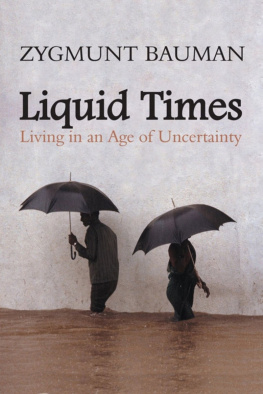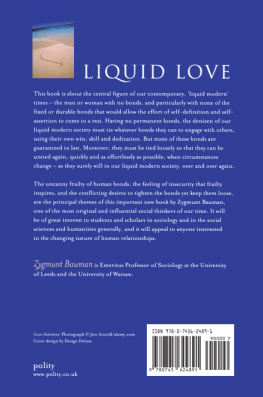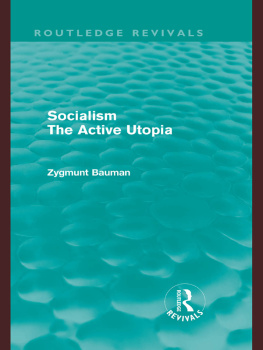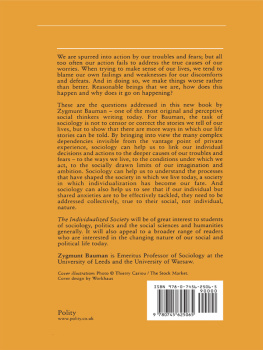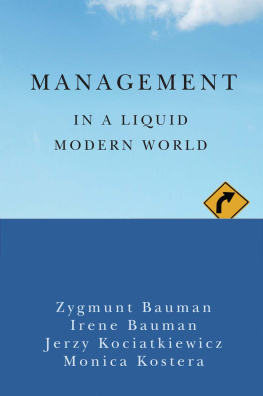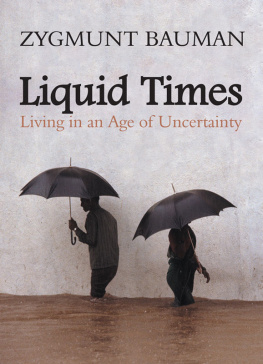Liquid Times
Liquid Times
Living in an Age of Uncertainty
ZYGMUNT BAUMAN
polity
Copyright Zygmunt Bauman 2007
The right of Zygmunt Bauman to be identied as Author of this Work has been asserted in accordance with the UK Copyright, Designs and Patents Act 1988.
First published in 2007 by Polity Press
Polity Press
65 Bridge Street
Cambridge CB2 1UR, UK
Polity Press
350 Main Street
Malden, MA 02148, USA
All rights reserved. Except for the quotation of short passages for the purpose of criticism and review, no part of this publication may be reproduced, stored in a retrieval system, or transmitted, in any form or by any means, electronic, mechanical, photocopying, recording or otherwise, without the prior permission of the publisher.
ISBN-13: 978-0-7456-3960-4
A catalogue record for this book is available from the British Library.
Typeset in 10.5 on 12 pt Plantin
by Servis Filmsetting Ltd, Manchester
Printed and bound in Malaysia by Alden Press
Every effort has been made to trace all copyright holders, but if any have been inadvertently overlooked the publishers will be pleased to include any necessary credits in any subsequent reprint or edition.
For further information on Polity, visit our website: www.polity.co.uk
Contents
INTRODUCTION
Bravely into the Hotbed of Uncertainties
At least in the developed part of the planet, a few seminal and closely interconnected departures have happened, or are happening currently, that create a new and indeed unprecedented setting for individual life pursuits, raising a series of challenges never before encountered.
First of all, the passage from the solid to a liquid phase of modernity: that is, into a condition in which social forms (structures that limit individual choices, institutions that guard repetitions of routines, patterns of acceptable behaviour) can no longer (and are not expected) to keep their shape for long, because they decompose and melt faster than the time it takes to cast them, and once they are cast for them to set. Forms, whether already present or only adumbrated, are unlikely to be given enough time to solidify, and cannot serve as frames of reference for human actions and long-term life strategies because of their short life expectation: indeed, a life expectation shorter than the time it takes to develop a cohesive and consistent strategy, and still shorter than the fullment of an individual life project requires.
Second, the separation and pending divorce of power and politics, the couple that since the emergence of the modern state and until quite recently was expected to share their joint nation-state household till death did them part. Much of the power to act effectively that was previously available to the modern state is now moving away to the politically uncontrolled global (and in many ways extraterritorial) space; while politics, the ability to decide the direction and purpose of action, is unable to operate effectively at the planetary level since it remains, as before, local. The absence of political control makes the newly emancipated powers into a source of profound and in principle untameable uncertainty, while the dearth of power makes the extant political institutions, their initiatives and undertakings, less and less relevant to the life problems of the nation-states citizens and for that reason they draw less and less of their attention. Between them, the two interrelated outcomes of the divorce enforce or encourage state organs to drop, transfer away, or (to use the recently fashionable terms of political jargon) to subsidiarize and contract out a growing volume of the functions they previously performed. Abandoned by the state, those functions become a playground for the notoriously capricious and inherently unpredictable market forces and/or are left to the private initiative and care of individuals.
Third, the gradual yet consistent withdrawal or curtailing of communal, state-endorsed insurance against individual failure and ill fortune deprives collective action of much of its past attraction and saps the social foundations of social solidarity; community, as a way of referring to the totality of the population inhabiting the sovereign territory of the state, sounds increasingly hollow. Interhuman bonds, once woven into a security net worthy of a large and continuous investment of time and effort, and worth the sacrice of immediate individual interests (or what might be seen as being in an individuals interest), become increasingly frail and admitted to be temporary. Individual exposure to the vagaries of commodity-and-labour markets inspires and promotes division, not unity; it puts a premium on competitive attitudes, while degrading collaboration and team work to the rank of temporary stratagems that need to be suspended or terminated the moment their benets have been used up. Society is increasingly viewed and treated as a network rather than a structure (let alone a solid totality): it is perceived and treated as a matrix of random connections and disconnections and of an essentially innite volume of possible permutations.
Fourth, the collapse of long-term thinking, planning and acting, and the disappearance or weakening of social structures in which thinking, planning and acting could be inscribed for a long time to come, leads to a splicing of both political history and individual lives into a series of short-term projects and episodes which are in principle innite, and do not combine into the kinds of sequences to which concepts like development, maturation, career or progress (all suggesting a preordained order of succession) could be meaningfully applied. A life so fragmented stimulates lateral rather than vertical orientations. Each next step needs to be a response to a different set of opportunities and a different distribution of odds, and so it calls for a different set of skills and a different arrangement of assets. Past successes do not necessarily increase the probability of future victories, let alone guarantee them; while means successfully tested in the past need to be constantly inspected and revised since they may prove useless or downright counterproductive once circumstances change. A swift and thorough forgetting of outdated information and fast ageing habits can be more important for the next success than the memorization of past moves and the building of strategies on a foundation laid by previous learning.
Fifth, the responsibility for resolving the quandaries generated by vexingly volatile and constantly changing circumstances is shifted onto the shoulders of individuals who are now expected to be free choosers and to bear in full the consequences of their choices. The risks involved in every choice may be produced by forces which transcend the comprehension and capacity to act of the individual, but it is the individuals lot and duty to pay their price, because there are no authoritatively endorsed recipes which would allow errors to be avoided if they were properly learned and dutifully followed, or which could be blamed in the case of failure. The virtue proclaimed to serve the individuals interests best is not conformity to rules (which at any rate are few and far between, and often mutually contradictory) but exibility: a readiness to change tactics and style at short notice, to abandon commitments and loyalties without regret and to pursue opportunities according to their current availability, rather than following ones own established preferences.
It is time to ask how these departures modify the range of challenges men and women face in their life pursuits and so, obliquely, inuence the way they tend to live their lives. This book is an attempt to do just that. To ask, but not to answer, let alone to pretend to provide denite answers, since it is its authors belief that all answers would be peremptory, premature and potentially misleading. After all, the overall effect of the departures listed above is the necessity to act, to plan actions, to calculate the expected gains and losses of the actions and to evaluate their outcomes under conditions of endemic uncertainty. The best the author has tried to do and felt entitled to do has been to explore the causes of that uncertainty and perhaps lay bare some of the obstacles that bar their comprehension and so also our ability to face up (singly and above all collectively) to the challenge which any attempt to control them would necessarily present.
Next page
